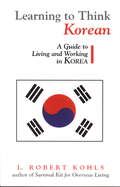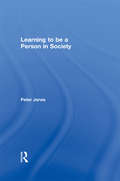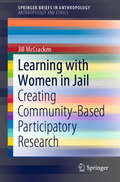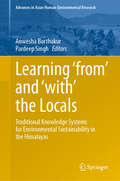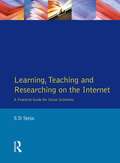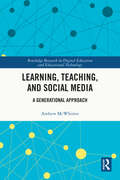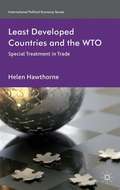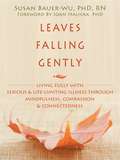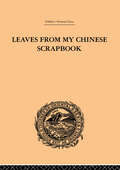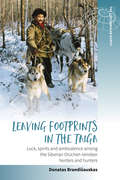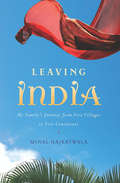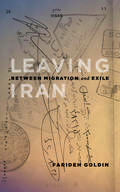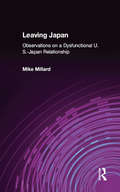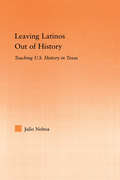- Table View
- List View
Learning to Think Korean: A Guide to Living and Working in Korea
by L. Robert KohlsKohls shares a feast of Korean culture: a ricebowl of history and tradition complimented by an array of spicy tidbits that capture the reader’s attention like a mouthful of kimchi. Based on personal experience, he provides critical incidents that explore the more puzzling aspects of Korean culture. Kohls explores Korean values—traditional values, value changes over the past forty years and projected values for the early decades of the twenty-first century. He is equally insightful when it comes to discussing the cultural patterns and practices of the workplace. He takes on management style, personal issues, networking and “pull,” negotiating style, persistence, key Korean business relations and more. To a greater extent than most other Asisan countries, Korea adheres to the traditional collectivist and Confucian traits of harmony, hierarchy, ingroups/outgroups, status, and proper behavior. According to Kohls, these traits plus the more Westernized values of the younger generations and the veneer of modern urban savvy surface in surprising combinations in personal and workplace relationships—often where they are least expected.
Learning to Win
by Pamela GrundyOver the past century, high school and college athletics have grown into one of America's most beloved--and most controversial--institutions, inspiring great loyalty while sparking fierce disputes.In this richly detailed book, Pamela Grundy examines the many meanings that school sports took on in North Carolina, linking athletic programs at state universities, public high schools, women's colleges, and African American educational institutions to social and economic shifts that include the expansion of industry, the advent of woman suffrage, and the rise and fall of Jim Crow. Drawing heavily on oral history interviews, Grundy charts the many pleasures of athletics, from the simple joy of backyard basketball to the exhilaration of a state championship run. She also explores conflicts provoked by sports within the state--clashes over the growth of college athletics, the propriety of women's competition, and the connection between sports and racial integration, for example. Within this chronicle, familiar athletic narratives take on new meanings, moving beyond timeless stories of courage, fortitude, or failure to illuminate questions about race, manhood and womanhood, the purpose of education, the meaning of competition, and the structure of American society.
Learning to be a Person in Society
by Peter JarvisLearning is a lifelong process and we are the result of our own learning. But how exactly do we learn to be a person through living? In this book, Peter Jarvis draws together all the aspects of becoming a person into the framework of learning. Considering the ongoing, "nature versus nurture" debate over how we become people, Jarvis’s study of nurture - what learning is primarily about – builds on a detailed recognition of our genetic inheritance and evolutionary reality. It demonstrates the ways in which we become social human beings: internalising, accommodating and rejecting the culture to which we are exposed (both primarily and through electronic mediation) while growing and developing as human beings and people. As learning theory moves away from traditional, single-discipline approaches it is possible to place the person at the centre of all thinking about learning, by emphasising a multi-disciplinary approach. This wide-ranging study draws on established research from a number of disciplines into the complexities that make us who we are. It will appeal to a wide variety of audiences: those involved in all fields of education, the study of learning and development, human resource development, psychology, theology and the caring professions.
Learning with Women in Jail: Creating Community-Based Participatory Research (SpringerBriefs in Anthropology)
by Jill McCrackenIn this monograph, the ethical implications of engaging in research with vulnerable populations is explored and demostrates how Community Based Participatory Research (CBPR) both enhances the research while addressing these ethical complexities. Although CBPR encompasses different levels of community engagement, in general, the participants, or co-researchers, are involved in the formulation of the research questions and methodologies because they are central to the conversation about what should be researched and how. Participants are directly involved in formulating the study problems and finding solutions, and usually the goal is to create social change that can be applied to and potentially transform the community.Learning with Women in Jail: Creating Community Based Participatory Research documents the research process to better understand the causes for incarceration and recidivism.The study used a (CBPR) framework so that the people who had directly experienced incarceration would lead the research as much as possible, from framing the research questions and methodologies to data capture and analysis.
Learning ‘from’ and ‘with’ the Locals: Traditional Knowledge Systems for Environmental Sustainability in the Himalayas (Advances in Asian Human-Environmental Research)
by Pardeep Singh Anwesha BorthakurThis book aims to capture the fading traditional knowledge systems of local and indigenous communities in the Himalayas. As many of these practices are at risk of disappearing, the book serves as a valuable record. It encourages readers to reflect on the implications of such knowledge for environmental sustainability today. Focusing on one of the most crucial mountain ranges globally, the book emphasizes the importance of learning ‘from’ and ‘with’ the locals about their lived experiences in the Himalayas. Understanding their unique set of traditional knowledge and technologies is crucial for building climate resilience and effective environmental management. With contributions from experts across the Himalayan region, the book strives for a comprehensive grasp of environmental challenges and potential solutions. Beyond documentation, the goal is to explore opportunities for integrating traditional knowledge with modern scientific approaches. Recognizing the urgency, the book advocates for the preservation of local and indigenous knowledge to address the ongoing global environmental crisis.
Learning, Teaching and Researching on the Internet: A Practical Guide for Social Scientists
by S. D. SteinLearning, Teaching and Researching on the Internet: A Practical Guide for Social Scientists is directed at students and academic staff who want to be able to access Internet resources quickly and efficiently without needing to become IT experts. The emphasis throughout is on the harnessing of the large volume of potentially useful Internet resources to everyday requirements, whether these be focused on learning, teaching or research. The Internet is a significantly rich information, communication and research resource for all those involved in higher education, whether they be students, academic staff involved in teaching and research, or educational administrators. Whilst the author has drawn on the large volume of technical literature, it is written on the basis of practical experience acquired over the many years of using Internet resources in the context of teaching undergraduate and postgraduate courses in the social sciences. In addition to extensive coverage on using Web browsers, searching for information at Web sites, in mailing lists and newsgroups, Part IV provides detailed annotations in the resources available at the best sites on the Internet collating materials on politics, sociology, economics, philosophy, psychology, history, human rights, European Union and other categories. The work is structured so that it will be found useful by both beginners and intermediate level users.
Learning, Teaching, and Social Media: A Generational Approach (Routledge Research in Digital Education and Educational Technology)
by Andrew McWhirterEmploying a unique generational approach, this book critically assesses social media in educational contexts across all educational levels: from primary and secondary schools to further and higher education, proposing a schema for social media literacy (SML). Using research obtained from fieldwork observations conducted in online teaching groups, surveys, and in-depth interviews with teachers and educators on the topic of social media and education, chapters interrogate the historical relationship between educator and learner, and use the frame of expert methodology to understand what educators themselves consider important about social media and education relative to their sectors. Bringing together current literature from education, learning and media technologies, along with longstanding debates around technological influence, chapters also draw on audience and communication studies, psychology and arts and humanities at a time when many different disciplines are trying to understand what social media means to our society. This interdisciplinary volume will be of great interest to academics, researchers and postgraduates in the fields of technology in education, media literacy, and critical digital media. Practitioners involved in the sociology of education will also find the book of use.
Least Developed Countries and the WTO
by Helen HawthorneA norm of special treatment for LDCs, created by the UN, has spread to various international organisations including the WTO. Within the WTO evidence of the institutionalization of the norm can be found both in the agreements and legal documents and the way in which the LDCs have been treated by other states. Helen Hawthorne investigates how norms impact on negotiations in international organisations. She shows that few studies of international organisations focus on the role of the weaker states in the organization, the majority focus either on the major states or the emerging economies. By ignoring the role of the poorer, weaker states in the GATT/WTO we are ignoring the history of these states in the organisation and do not get a true picture of the organization, how it operates in relation to them and their impact on the organisation.
Leave Your Phone at the Door: The Joy of OFFLINE
by Howard LewisLeave Your Phone at the Door acts as a timely and topical reminder to look beyond our phones and enjoy the physical benefits of community, randomness and serendipity.Real life happens beyond your phone screen. Leave Your Phone at the Door embraces the OFFLINE philosophy, which is a celebration of the much underrated virtues of randomness and serendipity. Whether sharing stories of unexpected encounters, alarming behavioral trends or the joys of quiet and contemplation, Howard Lewis encourages us to adopt an open mind and a generosity of spirit whenever we are confronted by the unfamiliar or surprising or different. We all have an innate desire to communicate but our constant reliance today upon personal technology is stripping our sensibilities bare. But rather than focusing upon the limitations of social media and phones, Lewis is far more animated by the mindful reframing of our place in the world. He offers his insights on the importance of relating to people in person and advice on developing social skills and habits that enrich our lives. What began as an informal gathering with friends led to the launch of the OFFLINE dinner, which he has hosted for over fifteen years in London. Guests are drawn from all walks of life and invited to engage with one another without the distraction of their phones. OFFLINE is designed to be the antithesis of everything online but also recognizes that veering off road and then back on it is both valuable and necessary. It aims to challenge and provoke, question and answer, stimulate and amuse, nurture and nourish in a delightful and congenial setting. This book is an embodiment of that ethos. Leave Your Phone at the Door acts as a timely and topical reminder to look beyond our phones and enjoy the physical benefits of community, randomness and serendipity. Who knows where it may take you and whom you might meet?!
Leaves Falling Gently: Living Fully With Serious and Life-Limiting Illness Through Mindfulness, Compassion and Connectedness
by Susan Bauer-Wu Joan HalifaxA life-limiting illness may have taken hold of your body, but you can still live more fully and openly than ever before. You can enrich your life by exploring ways to make peace with yourself and deepen connections with friends and family. This book will help you reap the benefits of mindfulness and acceptance, one day at a time. Leaves Falling Gently is a comforting guide to the mindfulness and compassion practices that will help you embrace the present moment, despite your illness. With each simple practice, you'll deepen your appreciation for the experiences that bring you joy and enhance your capacity for gratitude, generosity, and love. As you work through each personal reflection and guided meditation, you'll regain the strength to live fully, regardless of the changes and challenges that come.
Leaves From The Garden Of Eden
by Howard SchwartzIn Leaves from the Garden of Eden, Howard Schwartz, a three-time winner of the National Jewish Book Award, has gathered together one hundred of the most astonishing and luminous stories from Jewish folk tradition. Just as Schwartz's award-winning book Tree of Souls: The Mythology of Judaism collected the essential myths of Jewish tradition, Leaves from the Garden of Eden collects one hundred essential Jewish tales. As imaginative as the Arabian Nights, these stories invoke enchanted worlds, demonic realms, and mystical experiences. The four most popular types of Jewish tales are gathered here--fairy tales, folktales, supernatural tales, and mystical tales--taking readers on heavenly journeys, lifelong quests, and descents to the underworld. King David is still alive in the City of Luz, which the Angel of Death cannot enter, and somewhere deep in the forest a mysterious cottage contains the candle of your soul. In these stories, a bride who is not careful may end up marrying a demon, while the charm sewn into a dress may drive a pious woman to lascivious behavior. There is a dybbuk lurking in a well, a book that comes to life, and a world where Lilith, the Queen of Demons, seduces the unsuspecting. Here too are Jewish versions of many of the best-known tales, including "Cinderella," "Snow White," and "Rapunzel." Schwartz's retelling of one of these stories, "The Finger," inspired Tim Burton's film Corpse Bride. With its broad selection from written and oral sources, Leaves from the Garden of Eden is a landmark collection, representing the full range of Jewish folklore, from the Talmud to the
Leaves from My Chinese Scrapbook
by Frederic Henry BalfourFirst Published in 2000. Routledge is an imprint of Taylor & Francis, an informa company.
Leaving Footprints in the Taiga: Luck, Spirits and Ambivalence among the Siberian Orochen Reindeer Herders and Hunters (Studies in the Circumpolar North #1)
by Donatas BrandišauskasNowhere have recent environmental and social changes been more pronounced than in post-Soviet Siberia. Donatas Brandišauskas probes the strategies that Orochen reindeer herders of southeastern Siberia have developed to navigate these changes. “Catching luck” is one such strategy that plays a central role in Orochen cosmology -- luck implies a vernacular theory of causality based on active interactions of humans, non-humans, material objects, and places. Brandišauskas describes in rich details the skills, knowledge, ritual practices, storytelling, and movements that enable the Orochen to “catch luck” (or not, sometimes), to navigate times of change and upheaval.
Leaving Glorytown: One Boy's Struggle under Castro
by Eduardo F. CalcinesIn this absorbing memoir, by turns humorous and heartbreaking, Eduardo Calcines recounts his boyhood and chronicles the conditions that led him to wish above all else to leave behind his beloved extended family and his home for a chance at a better future.
Leaving Home, A Memoir
by Art BuchwaldThe early years of a humorist who was raised in foster homes.
Leaving Home: The Art of Separating from Your Difficult Family
by David CelaniWhy, after a childhood of emotional neglect and abuse, would a man move next door to the very parents who caused him pain? And how can a woman emerge from her mother's control in order to form healthy adult relationships?Giving up family attachments that failed to meet our needs as children, David Celani argues, is the hardest psychological task an adult can undertake. Yet the reality is that many adults re-create the most painful aspects of their early relationships with their parents in new relationships with peers and romantic partners, frustrating themselves and discouraging them from leaving their family of origin. Leaving Home emphasizes the life-saving benefits of separating from destructive parents and offers a viable program for personal emancipation.Celani's program is based on Object-Relations Theory, a branch of psychoanalysis developed by Scottish analyst Ronald Fairbairn. The human personality, Fairbairn argued, is not the result of inherited (and thus immutable) instincts. Rather, the developing child builds internal relational templates that guide his future interactions with others based on the conscious and unconscious memories he internalized from his primary relationship—the one he experienced with his parents. While a child's attachment to parents who were neglectful or even abusive is not uncommon, there is a way out. Articulate, sensitive, and replete with examples from Celani's twenty-six years of clinical practice, this book outlines the practical steps to leaving home.
Leaving India: My Family's Journey from Five Villages to Five Continents
by Minal HajratwalaThe PEN Award–winning chronicle of the Indian diaspora told through the stories of the author&’s own family. In this &“rich, entertaining and illuminating story,&” Minal Hajratwala mixes history, memoir, and reportage to explore the collisions of choice and history that led her family to emigrate from India (San Francisco Chronicle). &“Meticulously researched and evocatively written&” (The Washington Post), Leaving India looks for answers to the eternal questions that faced not only Hajratwala&’s own Indian family but all immigrants, everywhere: Where did we come from? Why did we leave? What did we give up and gain in the process? Beginning with her great-grandfather Motiram&’s original flight from British-occupied India to Fiji, where he rose from tailor to department store mogul, Hajratwala follows her ancestors across the twentieth-century to explain how they came to be spread across five continents and nine countries. As she delves into the relationship between personal choice and the great historical forces—British colonialism, apartheid, Gandhi&’s salt march, and American immigration policy—that helped shape her family&’s experiences, Hajratwala brings to light for the very first time the story of the Indian diaspora. A luminous narrative from &“a fine daughter of the continent, bringing insight, intelligence and compassion to the lives and sojourns of her far-flung kin,&” Leaving India offers a deeply intimate look at what it means to call more than one part of the world home (Alice Walker).
Leaving Iran: Between Migration and Exile
by Goldin FaridehIn 1976, at the age of twenty-three, Farideh Goldin left Iran in search of her imagined America. She sought an escape from the suffocation she felt under the cultural rules of her country and the future her family had envisioned for her. While she settled uneasily into American life, the political unrest in Iran intensified and in February of 1979, Farideh’s family was forced to flee Iran on the last El-Al flights to Tel Aviv. They arrived in Israel as refugees, having left everything behind including the only home Farideh’s father had ever known. Baba, as Farideh called her father, was a well-respected son of the chief rabbi and dayan of the Jews of Shiraz. During his last visit to the United States in 2006, he handed Farideh his memoir that chronicled the years of his life after exile: the confiscation of his passport while he attempted to return to Iran for his belongings, the resulting years of loneliness as he struggled against a hostile bureaucracy to return to his wife and family in Israel, and the eventual loss of the poultry farm that had supported his family. Farideh translated her father’s memoir along with other documents she found in a briefcase after his death. Leaving Iran knits together her father’s story of dislocation and loss with her own experience as an Iranian Jew in a newly adopted home. As an intimate portrait of displacement and the construction of identity, as a story of family loyalty and cultural memory, Leaving Iran is an important addition to a growing body of Iranian–American narratives.
Leaving Isn't the Hardest Thing: The New York Times bestseller
by Lauren Hough'Hough's conversational prose reads like the voice of a blues singer, taking breaks between songs to narrate her heartbreak in verse, cajoling her audience to laugh to keep from crying' - The New York Times'Hough's writing will break your heart' - Roxane Gay, author of Difficult Women'Each one told with the wit of David Sedaris, and the insight of Joan Didion' - Telegraph 'This moving account of resilience and hard-earned agency brims with a fresh originality' - Publishers WeeklySearing and extremely personal essays from the heart of working-class America, shot through with the darkest elements the country can manifest - cults, homelessness, and hunger - while discovering light and humor in unexpected corners.As an adult, Lauren Hough has had many identities: an airman in the U.S. Air Force, a cable guy, a bouncer at a gay club. As a child, however, she had none. Growing up as a member of the infamous cult The Children of God, Hough had her own self robbed from her. The cult took her all over the globe but it wasn't until she finally left for good that Lauren understood she could have a life beyond "The Family."Along the way, she's loaded up her car and started over, trading one life for the next. Here, as she sweeps through the underbelly of America--relying on friends, family, and strangers alike--she begins to excavate a new identity even as her past continues to trail her and color her world, relationships, and perceptions of self.At once razor-sharp, profoundly brave, and often very, very funny, the essays in Leaving Isn't the Hardest Thing interrogate our notions of ecstasy, queerness, and what it means to live freely. Each piece is a reckoning: of survival, identity, and how to reclaim one's past when carving out a future.
Leaving Isn't the Hardest Thing: The New York Times bestseller
by Lauren HoughSearing and extremely personal essays from the heart of working-class America, shot through with the darkest elements the country can manifest - cults, homelessness, and hunger - while discovering light and humor in unexpected corners.'Hough's writing will break your heart' - Roxane Gay, author of Difficult Women'An edgy and unapologetic memoir in essays' - Kirkus Reviews'This moving account of resilience and hard-earned agency brims with a fresh originality' - Publishers WeeklySearing and extremely personal essays from the heart of working-class America, shot through with the darkest elements the country can manifest - cults, homelessness, and hunger - while discovering light and humor in unexpected corners.As an adult, Lauren Hough has had many identities: an airman in the U.S. Air Force, a cable guy, a bouncer at a gay club. As a child, however, she had none. Growing up as a member of the infamous cult The Children of God, Hough had her own self robbed from her. The cult took her all over the globe--to Germany, Japan, Texas, Chile--but it wasn't until she finally left for good that Lauren understood she could have a life beyond "The Family."Along the way, she's loaded up her car and started over, trading one life for the next. She's taken pilgrimages to the sights of her youth, been kept in solitary confinement, dated a lot of women, dabbled in drugs, and eventually found herself as what she always wanted to be: a writer. Here, as she sweeps through the underbelly of America--relying on friends, family, and strangers alike--she begins to excavate a new identity even as her past continues to trail her and color her world, relationships, and perceptions of self.At once razor-sharp, profoundly brave, and often very, very funny, the essays in Leaving Isn't the Hardest Thing interrogate our notions of ecstasy, queerness, and what it means to live freely. Each piece is a reckoning: of survival, identity, and how to reclaim one's past when carving out a future.(P) 2021 Hodder & Stoughton Ltd
Leaving It at the Office, Second Edition: A Guide to Psychotherapist Self-Care
by John C. Norcross Gary R. VandenBosMental health professionals provide better care to their clients when they care for themselves. This highly practical guide--now revised and expanded with even more self-care strategies--has helped thousands of busy psychotherapists balance their personal and professional lives. The book presents 13 research-informed self-care strategies and offers concrete methods for integrating them into daily life. Featuring examples and insights from master therapists, every chapter concludes with a self-care checklist. Infused with a positive message of self-renewal and growth, the book shows clinicians how to leave distress at the office and tend actively to their physical, emotional, and spiritual needs. New to This Edition *Chapter on mindfulness and self-compassion. *Increased emphasis on simple, real-time self-care activities. *New examples from additional master therapists and hundreds of workshop participants. *Up-to-date research findings on therapist stress and resilience. *Discussions of competence constellations, building on self-care strengths, moral stress, deliberate practice, presession preparation, journaling, and multiculturalism.
Leaving Japan: Observations on a Dysfunctional U.S.-Japan Relationship
by Mike MillardA critique of America's flawed Asia policy that centres on US-Japan relations but harkens back to the same disastrous views that drew America into Vietnam. The technique is a narrative flow of short vignettes woven into longer chapters; the main strands are personal reflections and interviews.
Leaving Latinos Out of History: Teaching US History in Texas
by Julio NoboaDespite being the state with perhaps the longest history of Latino presence, power and influence, Texas has very much under-represented Latinos in its schools history curriculum. Through an analysis of teaching materials and curriculum goals, Noboa investigates the extent to which this significant minority is effectively excluded from American historical narrative.
Leaving Leningrad
by Ludmila ShternAlthough women writers have held a conspicuous place in the history of modern Russian literature, they have been slow to find their true voices in exile. Ludmila Shtern, a geologist/writer who emigrated to the US from the Soviet Union in 1975, offers a completely fresh, unsentimental look at daily life in the former Soviet Union and the US in the second half of the 20th century. Her memoir, part comic bildungsroman, part picaresque adventure, shows its heroine, Tatyana Dargis, growing up in the USSR, falling in love, falling afoul of the KGB, and finally emigrating to the US where new absurdities (capitalist rather than communist in nature) prevail. An amalgam of bittersweet understatement and mordant wit, Shtern's prose is shaped by her ear for a wide range of human voices and the stories they tell, and by her eye for the grotesqueries and savagely funny pain of modern life.
Leaving Microsoft to Change the World
by John WoodJohn Wood discovered his passion, his greatest success, and his life's work not at business school or helping lead Microsoft's charge into Asia in the 1990s but on a soul-searching trip to the Himalayas. He made the difficult decision to walk away from his lucrative career to create Room to Read, a nonprofit organization that promotes education across the developing world. By the end of 2007, the organization will have established over 5,000 libraries and 400 schools, and awarded long-term scholarships to more than 3,000 girls, giving more than one million children the lifelong gift of education. If you have ever pondered abandoning your desk job for an adventure and an opportunity to give back, Wood's story will inspire you. He offers a vivid, emotional, and absorbing tale of how to take the lessons learned at a hard-charging company like Microsoft and apply them to the world's most pressing social problems.
